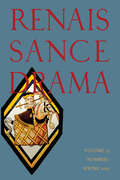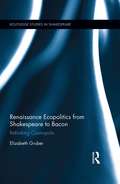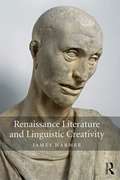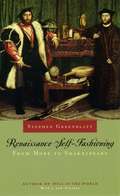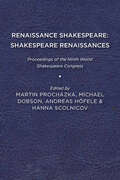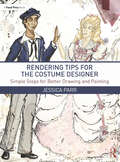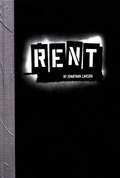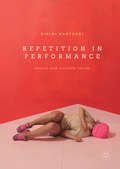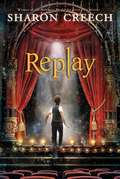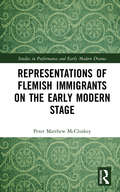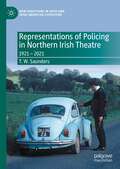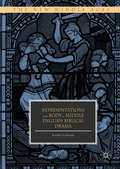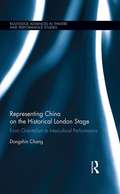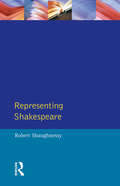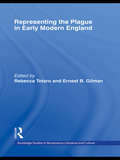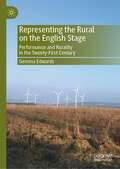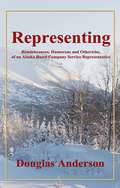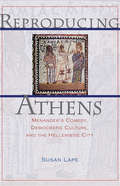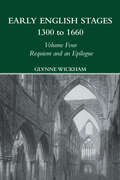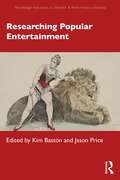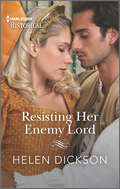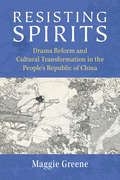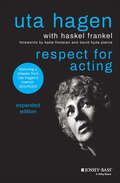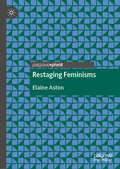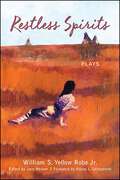- Table View
- List View
Renaissance Drama, volume 53 number 1 (Spring 2025)
by Renaissance DramaThis is volume 53 issue 1 of Renaissance Drama. Renaissance Drama explores the rich variety of theatrical and performance traditions and practices in early modern Europe and intersecting cultures. The sole scholarly journal devoted to the full expanse of Renaissance theatre and performance, the journal publishes articles that extend the scope of our understanding of early modern playing, theatre history, and dramatic texts and interpretation, encouraging innovative theoretical and methodological approaches to these traditions, examining familiar works, and revisiting well-known texts from fresh perspectives.
Renaissance Ecopolitics from Shakespeare to Bacon: Rethinking Cosmopolis (Routledge Studies in Shakespeare)
by Elizabeth D. GruberThe work of Shakespeare and his contemporaries has often been the testing-ground for innovations in literary studies, but this has not been true of ecocriticism. This is partly because, until recently, most ecologically minded writers have located the origins of ecological crisis in the Enlightenment, with the legacies of the Cartesian cogito singled out as a particular cause of our current woes. Traditionally, Renaissance writers were tacitly (or, occasionally, overtly) presumed to be oblivious of environmental degradation and unaware that the episteme—the conceptual edifice of their historical moment—was beginning to crack. This perception is beginning to change, and Dr. Guber's work is poised to illuminate the burgeoning number of ecocritical studies devoted to this period, in particular, by showing how the classical concept of the cosmopolis, which posited the harmonious integration of the Order of Nature (cosmos) with the Order of Society (polis), was at once revived and also systematically dismantled in the Renaissance. Renaissance Ecopolitics from Shakespeare to Bacon: Rethinking Cosmopolis demonstrates that the Renaissance is the hinge, the crucial turning point in the human-nature relationship and examines the persisting ecological consequences of the nature-state’s demise.
Renaissance Literature and Linguistic Creativity
by James HarmerRenaissance Literature and Linguistic Creativity interrogates notions of linguistic creativity as presented in English literary texts of the late sixteenth century. It considers the reflections of Renaissance English writers upon the problem of how linguistic meaning is created in their work. The book achieves this consideration by placing its Renaissance authors in the context of the dominant conceptualisation of the thought-language relationship in the Western tradition: namely, that of 'introspection'. In taking this route, author James Harmer undertakes to provide a comprehensive overview of the notion of 'introspection' from classical times to the Renaissance, and demonstrates how complex and even strange this notion is often seen to be by thinkers and writers. Harmer also shows how poetry and literary discourse in general stands at the centre of the conceptual consideration of what linguistic thinking is. He then argues, through a range of close readings of Renaissance texts, that writers of the Shakespearean period increase the fragility of the notion of 'introspection' in such a way as to make the prospect of any systematic theory of meaning seem extremely remote. Embracing and exploring the possibility that thinking about meaning can only occur in the context of extreme cognitive and psychological limitation, these texts emerge as proponents of a human mind which is remarkably free in its linguistic nature; an irresistible mode of life unto itself. The final argumentative stratum of the book explores the implications of this approach for understanding the relationship between literary criticism, philosophy, and other kinds of critical activity. Texts discussed at length include Edmund Spenser's The Faerie Queene and shorter poetry, George Chapman's Ovids Banquet of Sence, Shakespeare's Titus Andronicus and Hamlet, and John Donne's Elegies.
Renaissance Self-Fashioning: From More to Shakespeare
by Stephen GreenblattRenaissance Self-Fashioning is a study of sixteenth-century life and literature that spawned a new era of scholarly inquiry. Stephen Greenblatt examines the structure of selfhood as evidenced in major literary figures of the English Renaissance—More, Tyndale, Wyatt, Spenser, Marlowe, and Shakespeare—and finds that in the early modern period new questions surrounding the nature of identity heavily influenced the literature of the era. Now a classic text in literary studies, Renaissance Self-Fashioning continues to be of interest to students of the Renaissance, English literature, and the new historicist tradition, and this new edition includes a preface by the author on the book's creation and influence. "No one who has read [Greenblatt's] accounts of More, Tyndale, Wyatt, and others can fail to be moved, as well as enlightened, by an interpretive mode which is as humane and sympathetic as it is analytical. These portraits are poignantly, subtly, and minutely rendered in a beautifully lucid prose alive in every sentence to the ambivalences and complexities of its subjects."—Harry Berger Jr., University of California, Santa Cruz
Renaissance Shakespeare/Shakespeare Renaissances: Proceedings of the Ninth World Shakespeare Congress
by Stanley Wells Sukanta Chaudhuri Randall Martin Brian Walsh Ros King James J. Marino Graham Holderness Barry Freeman Shaul Bassi Ann Jennalie Cook Emma Depledge Jean-Christophe Mayer Patrick Lonergan Courtney Lehmann Sharon O'Dair Poonam Trivedi Supriya Chaudhuri Darryl Chalk M. A. Katritzky Jill L. Levenson Margaret Shewring Hersh Zeifman Robert Darcy Joel Rodgers Atsuhiko Hirota Kimberly R. West Richard Fotheringham Eleanor Collins Martin Hilský Vlasta Gallerová Karel Kríž Robert Sturua Galz Engler Madalina Nicolaescu Kaori Kobayashi Zeno Ackermann Tina Krontiris Emily Oliver Carla Della Gatta Cristiane Busato Smith Anna Cetera Bi-Qi Beatrice LeiSelected contributions to the Ninth World Shakespeare Congress, which took place in July 2011 in Prague, represent the contemporary state of Shakespeare studies in thirty-eight countries worldwide. Apart from readings of Shakespeare’s plays and poems, more than forty chapters map Renaissance contexts of his art in politics, theater, law, or material culture and discuss numerous cases of the impact of his works in global culture from the Americas to the Far East, including stage productions, book culture, translations, film and television adaptations, festivals, and national heritage. The last section of the book focuses on the afterlife of Shakespeare in the work of the leading British dramatist Tom Stoppard. Published by University of Delaware Press. Distributed worldwide by Rutgers University Press.
Rendering Tips for the Costume Designer: Simple Steps for Better Drawing and Painting
by Jessica ParrRendering Tips for the Costume Designer: Simple Steps for Better Drawing and Painting is a guide for students and costume designers who want to improve their drawing, painting, and rendering skills. The book is divided into three sections – Drawing Tips, Painting Tips, and Linework Tips – and includes detailed step-by-step instructions for chapters such as "How to Draw Faces and Hair," "How to Draw Hands," and "How to Draw Feet and Shoes". This format allows readers to pick and choose which techniques to study, enabling them to focus on the areas that give them the most difficulty. Filled with practical information and over 100 illustrations, this reference guide can be used in conjunction with any figure drawing method or painting media. Within these pages, readers will find the answers to the most common rendering questions: Where do the shadows go? How do I make my figures look less stiff? How do I draw patterned fabric? Rendering Tips for the Costume Designer is an invaluable resource for students in Costume Rendering and Costume Design courses, along with professional costume designers looking to improve their rendering skills.
Rent
by Jonathan LarsonThe full story of Rent, Jonathan Larson's musical opera, including the libretto and biographies of the original cast members.<P><P> Pulitzer Prize Winner
Repetition in Performance
by Eirini KartsakiThis book explores repetition in contemporary performance and spectatorship. It offers an impassioned account of the ways in which speech, movement and structures repeat in performances by Pina Bausch, Anne Teresa De Keersmaeker, Lone Twin Theatre, Haranczak/Navarre and Marco Berrettini. It addresses repetition in relation to processes of desire and draws attention to the forces that repetition captures and makes visible. What is it in performances of repetition that persuades us to return to them again and again? How might we unpack their complexities and come to terms with their demands upon us? While considering repetition in relation to the difficult pleasures we derive from the theatre, this book explores ways of accounting for such experiences of theatre in memory and writing.
Replay
by Sharon CreechLeo's papa stood in the doorway, gazing down at him. "Leo, you make gold from pebbles," and the way he said it, Leo could tell that this was a good thing. He may have been given a bit part in the school play ... but Leo dreams he is the biggest star on Broadway. Sure, his big, noisy family makes him feel like a sardine squashed in a tin ... but in his fantasy he gets all the attention he wants. Yes, his papa seems sad and distracted ... but Leo imagines him as a boy, tap-dancing and singing with delight. That's why they call Leo "fog boy." He's always dreaming, always replaying things in his brain. He fantasizes about who he is in order to discover who he will become. As an actor in the school play, he is poised and ready for the curtain to open. But in the play that is his life, Leo is eager to discover what part will be his.
Representations of Flemish Immigrants on the Early Modern Stage (Studies in Performance and Early Modern Drama)
by Peter Matthew McCluskeyImmigrants from the Low Countries constituted the largest population of resident aliens in early modern England. Possessing superior technology in a number of fields and enjoying governmental protection, the Flemish were charged by many native artisans with unfair economic competition. With xenophobic sentiments running so high that riots and disorders occurred throughout the sixteenth century, Elizabeth I directed her dramatic censor to suppress material that might incite further disorder, forcing playwrights to develop strategies to address the alien problem indirectly. Representations of Flemish Immigrants on the Early Modern Stage describes the immigrant community during this period and explores the consistently negative representations of Flemish immigrants in Tudor interludes, the impact of censorship, the playwrighting strategies that eluded it, and the continuation of these methods until the closing of the theatres in 1642.
Representations of Policing in Northern Irish Theatre: 1921 – 2021 (New Directions in Irish and Irish American Literature)
by T. W. SaundersThis monograph provides the first sustained, chronological account of Northern Irish police officers’ representation in theatre. Importantly, its scope comprises a critical period of national and organisational development, beginning with the Partition of Ireland in 1921 and the founding of the Royal Ulster Constabulary (RUC) one year later in 1922. It progresses through the relevant theatrical and historical events of the century, through the period after the RUC’s dissolution and replacement with the Police Service of Northern Ireland (PSNI) in 2001, and concludes in 2021 to coincide with the centenary of Partition. As such, this project is distinctive in its ability to trace paradigm shifts in perceptions of the police over time, as they intersect with relevant historical events and milestones of political conflict in the province.
Representations of the Body in Middle English Biblical Drama (The New Middle Ages)
by Estella CiobanuRepresentations of the Body in Middle English Biblical Drama combines epistemological enquiry, gender theory and Foucauldian concepts to investigate the body as a useful site for studying power, knowledge and truth. Intertwining the conceptualizations of violence and the performativity of gender identity and roles, Estella Ciobanu argues that studying violence in drama affords insights into the cultural and social aspects of the later Middle Ages. The text investigates these biblical plays through the perspective of the devil and offers a unique lens that exposes medieval disquiets about Christian teachings and the discourse of power. Through detailed primary source analysis and multidisciplinary scholarship, Ciobanu constructs a text that interrogates the significance of performance far beyond the stage.
Representing China on the Historical London Stage: From Orientalism to Intercultural Performance (Routledge Advances in Theatre & Performance Studies)
by Dongshin ChangThis book provides a critical study of how China was represented on the historical London stage in selected examples from the late seventeenth century to the early twentieth century—which corresponds with the Qing Dynasty (1644-1911), China’s last monarchy. The examples show that during this historical period, the stage representations of the country were influenced in turn by Jesuit writings on China, Britain’s expanding material interest in China, the presence of British imperial power in Asia, and the establishment of diasporic Chinese communities abroad. While finding that many of these works may be read as gendered and feminized, Chang emphasizes that the Jesuits’ depiction of China as a country of high culture and in perennial conflict with the Tartars gradually lost prominence in dramatic imaginations to depictions of China’s material and visual attractions. Central to the book’s argument is that the stage representations of China were inherently intercultural and open to new influences, manifested by the evolving combinations of Chinese and English (British) traits. Through the dramatization of the Chinese Other, the representations questioned, satirized, and put in sharp relief the ontological and epistemological bases of the English (British) Self.
Representing Shakespeare: England, History and the RSC
by Robert ShaughnessyThis text traces the changing theatrical and cultural identity of the History plays in the context of postwar social and political conflict, crisis and change. Since the company's inception in the early 1960s, the RSC's commitment to relevance has fostered close relationships between Shakespearean criticism and performance, and between the theatre and its audiences. Through a detailed discussion of key productions, from "The War of the Roses" in 1963 to "The Plantegenets" in 1988, Robert Shaughnessy emphasizes the political dimension of contemporary theatrical representations of Shakespeare, and of the "Shakespearean" modes of history that these plays have been employed to promote; individualist, cyclical, male-dominated, and driven by essentialised, transcendent human nature.
Representing the Plague in Early Modern England (Routledge Studies In Renaissance Literature And Culture Ser. #14)
by Rebecca TotaroThis collection offers readers a timely encounter with the historical experience of people adapting to a pandemic emergency and the corresponding narrative representation of that crisis, as early modern writers transformed the plague into literature. The essays examine the impact of the plague on health, politics, and religion as well as on the plays, prose fiction, and plague bills that stand as witnesses to the experience of a society devastated by contagious disease. Readers will find physicians and moralists wrestling with the mysteries of the disease; erotic escapades staged in plague-time plays; the poignant prose works of William Bullein and Thomas Dekker; the bodies of monarchs who sought to protect themselves from plague; the chameleon-like nature of the plague as literal disease and as metaphor; and future strains of plague, literary and otherwise, which we may face in the globally-minded, technology-dependent, and ecologically-awakened twenty-first century. The bubonic plague compelled change in all aspects of lived experience in Early Modern England, but at the same time, it opened space for writers to explore new ideas and new literary forms—not all of them somber or horrifying and some of them downright hilarious. By representing the plague for their audiences, these writers made an epidemic calamity intelligible: for them, the dreaded disease could signify despair but also hope, bewilderment but also a divine plan, quarantine but also liberty, death but also new life.
Representing the Rural on the English Stage: Performance and Rurality in the Twenty-First Century
by Gemma EdwardsThis book explores how the English rural has been represented in contemporary theatre and performance. Exploring a range of plays, forms, and contexts of theatre production, Representing the Rural celebrates the lively engagement with rurality on English stages since 2000, constituting the first full study of theatrical representations of rural life. Interdisciplinary in its approach, this book draws on political philosophy and cultural geography in its definitions of rurality and Englishness, and works with key theoretical concepts such as nostalgia and ethnonationalism. Covering a range of perspectives from the country garden in Mike Bartlett’s Albion to agricultural labour in Nell Leyshon’s The Farm, the enclosure acts in D.C. Moore’s Common to Black rural history in Testament’s Black Men Walking, the book shows how theatre and performance can open up different ways of reading rural geographies, histories, and lives. While Representing the Rural is aimed at students and researchers of theatre and performance, its interdisciplinary scope means that it has wider appeal to other disciplines in the arts and humanities, including geography, politics, and history.
Representing: Reminiscences; Humorous and Otherwise, of an Alaska Based Company Service Representative
by Douglas AndersonDouglas Anderson, the author, was born in Derbyshire, England. After his father passed away, Douglas went to live on his Grandfather's farm. Never very interested in animal husbandry, he leaned more toward the mechanical aspects of farming: maintaining and operating machinery. After an apprenticeship in the mechanical field, Douglas joined Rolls-Royce and began an interesting and diverse career. In the ensuing years, that career encompassed: jet engines, rocket engines and industrial gas turbines. Douglas immigrated to Canada in 1967, to the USA in 1977 and back to Canada in 2001. An adventurous fourteen years while supporting RR products in Alaska prompted Douglas to write and to become a published author. For many years, Anderson traveled and represented the company. Representing covers those years and some of the situations, humorous and otherwise, that he and his fellow Reps encountered at home base and at far-away places. The characters are real and these events actually happened as described. Most are documented for the first time in Representing.
Reproducing Athens: Menander's Comedy, Democratic Culture, and the Hellenistic City
by Susan LapeReproducing Athens examines the role of romantic comedy, particularly the plays of Menander, in defending democratic culture and transnational polis culture against various threats during the initial and most fraught period of the Hellenistic Era. Menander's romantic comedies--which focus on ordinary citizens who marry for love--are most often thought of as entertainments devoid of political content. Against the view, Susan Lape argues that Menander's comedies are explicitly political. His nationalistic comedies regularly conclude by performing the laws of democratic citizen marriage, thereby promising the generation of new citizens. His transnational comedies, on the other hand, defend polis life against the impinging Hellenistic kingdoms, either by transforming their representatives into proper citizen-husbands or by rendering them ridiculous, romantic losers who pose no real threat to citizen or city. In elaborating the political work of romantic comedy, this book also demonstrates the importance of gender, kinship, and sexuality to the making of democratic civic ideology. Paradoxically, by championing democratic culture against various Hellenistic outsiders, comedy often resists the internal status and gender boundaries on which democratic culture was based. Comedy's ability to reproduce democratic culture in scandalous fashion exposes the logic of civic inclusion produced by the contradictions in Athens's desperately politicized gender system. Combining careful textual analysis with an understanding of the context in which Menander wrote, Reproducing Athens profoundly changes the way we read his plays and deepens our understanding of Athenian democratic culture.
Requiem and an Epilogue
by Glynne WickhamFirst published in 2002.This volume forms part of the 5 volume set Early English Stages 1300-1660. This set examines the history of the development of dramatic spectacle and stage convention in England from the beginning of the fourteenth century to 1660.
Researching Popular Entertainment (Routledge Advances in Theatre & Performance Studies)
by Jason Price Kim BastonResearching Popular Entertainment is an essential volume for scholars delving into the vibrant yet complex world of popular entertainment.Written by a global network of experts, this book addresses the unique challenges researchers face in this field. The often-dismissed status of popular entertainment, coupled with its reliance on physicality and improvisation over scripted performances, has meant archival and textual sources tend to be more limited than in related theatre and performance disciplines. This scarcity requires historians to find alternative pathways through the available materials to recuperate seemingly insignificant figures and performance forms from our cultural past. This book provides a candid look into the research processes of its authors, highlighting some of the approaches they have adopted to overcome these challenges. It emphasises that reading performance as entertainment is a deliberate methodological choice. Regardless of whether a work is deemed high or low art, legitimate or illegitimate, understanding how it captivates its audience is central to the study of entertainment.Readers will benefit from its in-depth analysis and practical guidance, making it an indispensable resource for anyone studying popular entertainment.
Resisting Her Enemy Lord (Mills And Boon Historical Ser.)
by Helen DicksonA tumultuous journeyA tale of war, betrayal and passion…Despite her unhappy marriage, Catherine Stratton had defended her husband’s castle for six years while he was at war. Now widowed, she must travel with John, her late husband’s cousin, who’d fought on the opposing side. Facing danger at every turn, she’s stunned by the heat burning between them. Is this just lust, which will pass…or is this enemy lord a man she can trust with her life and her future?From Harlequin Historical: Your romantic escape to the past.
Resisting Spirits: Drama Reform and Cultural Transformation in the People's Republic of China (China Understandings Today)
by Maggie GreeneResisting Spirits is a reconsideration of the significance and periodization of literary production in the high socialist era, roughly 1953 through 1966, specifically focused on Mao-era culture workers’ experiments with ghosts and ghost plays. Maggie Greene combines rare manuscript materials—such as theatre troupes’ annotated practice scripts—with archival documents, memoirs, newspapers, and films to track key debates over the direction of socialist aesthetics. Through arguments over the role of ghosts in literature, Greene illuminates the ways in which culture workers were able to make space for aesthetic innovation and contestation both despite and because of the constantly shifting political demands of the Mao era. Ghosts were caught up in the broader discourse of superstition, modernization, and China’s social and cultural future. Yet, as Greene demonstrates, the ramifications of those concerns as manifested in the actual craft of writing and performing plays led to further debates in the realm of literature itself: If we remove the ghost from a ghost play, does it remain a ghost play? Does it lose its artistic value, its didactic value, or both? At the heart of Greene’s intervention is “just reading”: the book regards literature first as literature, rather than searching immediately for its political subtext, and the voices of dramatists themselves finally upstage those of Mao’s inner circle. Ironically, this surface reading reveals layers of history that scholars of the Mao era have often ignored, including the ways in which social relations and artistic commitments continued to inform the world of art. Focusing on these concerns points to continuities and ruptures in the cultural history of modern China beyond the bounds of “campaign time.” Resisting Spirits thus illuminates the origins of more famous literary inquisitions, including that surrounding Hai Rui Dismissed from Office, by exploring ghost plays such as Li Huiniang that at first appear more innocent. To the contrary, Greene shows how the arguments surrounding ghost plays and the fates of their authors place the origins of the Cultural Revolution several years earlier, with a radical new shift in the discourse of theatre.
Respect for Acting: Expanded Version
by Uta HagenThe classic book on acting, in an attractive updated edition Since its original publication in 1973, Uta Hagen's Respect for Acting has remained a durable classic and a must-read for all students of acting. As an acting instructor at the Herbert Berghof Studio, Hagen helped to develop the talents of world-class actors like Robert DeNiro, Matthew Broderick, Gene Wilder, Amanda Peet, Austin Pendleton, Whoopi Goldberg, and more. In this book, Hagen offers an indispensable account of the techniques that professionals use to elevate their acting to an art form. This updated edition illuminates Hagen's original text with a new foreword written by Katie Finneran, retaining the David Hyde Pierce foreword, along with added background on HB Studio—one of the original New York performing arts training and practice spaces—and an excerpt from Hagen's autobiography SOURCES. In working through this book, actors will learn physical, verbal, and emotional practice that empower them to connect their own self-concept to the characters they play. Specific, detailed exercises help actors learn to address a range of problems actors face, like maintaining immediacy and relevance, and developing the dimensions of a role over a long performance run. Respect for Acting is a book for actors and audiences who understand the need for truth in the creative process. Discover the acting book that has shaped professional theater performances for decades Learn the history and background of Herbert Berghof Studio, one of New York's foremost acting schools Practice the craft of acting with concrete exercises and instruction on technique Delve into the deep questions that arise when actors truly inhabit the lives of their characters Actors at all levels of their craft will love this stunning updated version of the essential Respect for Acting.
Restaging Feminisms
by Elaine AstonRestaging Feminisms offers a re-encounter with the tripartite modelling of liberal, radical, and socialist feminisms foundational to establishing feminist approaches to theatre. This lucid account of past-present connections to the staging of feminism assesses the legacies and renewals of all three feminist dynamics as they intersect with austerity Britain, the Weinstein watershed, and the #MeToo movement. Feminist politics, concepts, and the role of affect in the making of political attachments inform an approach that values understanding feminism’s past as critical to reanimating and restaging socially progressive, feminist futures. The volume includes case studies of productions staged between 2016 and 2019: Caryl Churchill’s Escaped Alone; David Greig’s version of The Suppliant Women; Morgan Lloyd Malcolm’s Emilia; Nina Raine’s Consent; Townsend Theatre’s We Are The Lions Mr Manager; and Laura Wade’s Home, I’m Darling. From an author with a pioneering and thirty-year-long commitment to the study of feminism and British theatre, Restaging Feminisms is for an intergenerational feminist-theatre readership: for those who are discovering relations between feminism and theatre for the first time and those re-encountering the feminist dynamics and their renewed resonance on the contemporary British stage.
Restless Spirits: Plays (Excelsior Editions)
by William S. Yellow RobeFinalist for the 2020 ForeWord INDIE Book of the Year in the Multicultural Adult Fiction Category Restless Spirits is a collection of previously unpublished plays by contemporary Assiniboine playwright William S. Yellow Robe Jr. Including one full-length and seven one-act plays, this book reflects one of the author's most creative and productive periods in his career. Selected by Yellow Robe, in consultation with editor Jace Weaver, the plays reveal the range of Yellow Robe's writing from tragedies to farce. They are unified by their supernatural themes or significant elements, including Wood Bones, his most recent and highly successful full-length play. Weaver's introduction says that the works in this collection clearly demonstrate that Yellow Robe is not just a great American Indian playwright, but a great American playwright in the company of David Mamet, Lynn Nottage, and Wallace Shawn. Renowned American Indian playwright Hanay L. Geiogamah provides a foreword and calls this volume "a real gift to the American Indian theater—and to theater, more generally."
